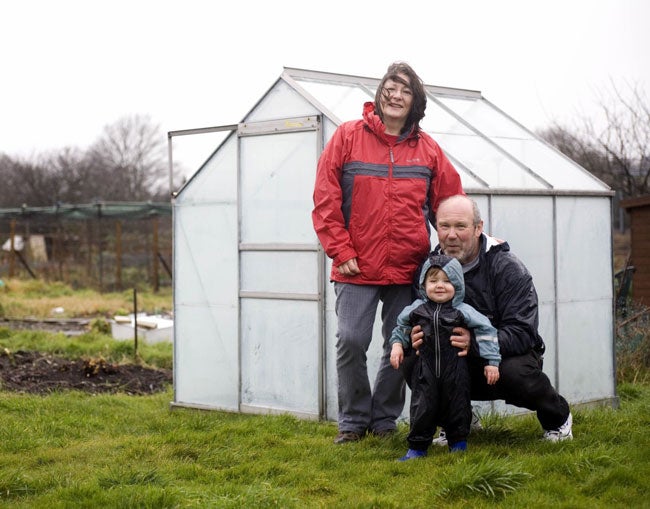Grow your own way: How to join the allotment in-crowd
The plot is thickening as more people, of all ages, cultivate their own cabbages to fight global warming. Tom McTague looks at the benefits and the costs

Go down to an allotment and you're bound to find the flat-cap brigade out in force – retired men chatting about carrots and gooseberries. But now you're almost as likely to discover young urbanites, families and women tending their cabbages.
Peter Hulme-Cross of the London Assembly, who has written a report on allotments, says: "They are more popular than ever. Lots of people and all sorts of ethnicities and nationalities are getting involved." In the London borough of Camden, there is a waiting time of 10 years for an allotment.
What's behind their popularity? Mark Todd from Greenhelpline.com cites growing awareness of "food air miles" – the distance travelled by produce from where it was grown. "People sourcing local food is part of the answer to global warming. It's simple really but your carbon footprint will be much lower if you grow your own blueberries rather than flying them in from Argentina."
Other factors include the increased appetite for organic food and the possibility of cutting down on grocery bills. For instance, the National Society of Allotment and Leisure Gardeners (www.nsalg.org.uk) says you can produce up to £500 worth of food a year from an average allotment.
In most parts of the UK, there is no reason why you shouldn't be able to find a plot immediately. Every local authority, with the exception of the inner London boroughs, has a statutory duty to provide allotments where there is demand. In the capital, says Jeff Stokes, national secretary of the NSALG, "there is a greater chance of having to go on a waiting list".
Around 90 per cent of allotments are council-owned and rents tend to be low. An average plot is "10 poles" (an old measurement of length from the back of a plough to the nose of an ox) or 25 metres by 10 metres – and the rate tends to be between £15 and £30 a year, although in London it can be as high as £120.
If you are happy with the location, size and cost, make sure you go and talk to other allotment holders on the site about the availability of running water, on-site toilets and other important but slightly under-the-radar considerations.
Allotments are also prone to vandalism and theft. Insurance can be obtained through the NSALG but it is expensive, with annual flat-rate premiums of £10 for each £100 insured.
Then there are the inevitable rules and regulations to deal with. Most allotments allow chickens (though not roosters) and rabbits but do not permit any other livestock. It is, however, worth checking.
Some allotment schemes will also have rules regarding whether or not, or how much, produce you can sell. In general, you are not allowed to use your allotment as a business, but it may be that excess fruit and vegetables can be sold.
He found a way to 'recharge the batteries' and stayed for 40 years
In one sense, Steve Clements from south London, who turns 61 this year, is the stereotypical allotment holder.
Using it to "recharge the batteries", he has stopped off on the way back from work to look after his allotment for nearly 40 years. His wife Chris, 57, even jokingly describes herself as an "allotment widow", saying it can "take over his life sometimes".
But on the other hand, Steve and Chris say how much their foster children and 10 grandkids love the allotment. With two 10- pole plots (each one is 250 square metres) costing £80 a year in total, Steve says: "To some degree we're self-sufficient – we can even supply friends and family as well – but it doesn't really work like that. Besides, we don't tend to think of it in those terms.
"We more or less grow the basics – cabbages, runner beans, potatoes, leaks, that kind of stuff – as well as soft fruits like blueberries, gooseberries and raspberries."
Subscribe to Independent Premium to bookmark this article
Want to bookmark your favourite articles and stories to read or reference later? Start your Independent Premium subscription today.

Join our commenting forum
Join thought-provoking conversations, follow other Independent readers and see their replies